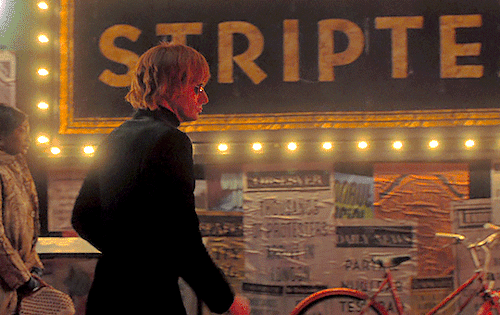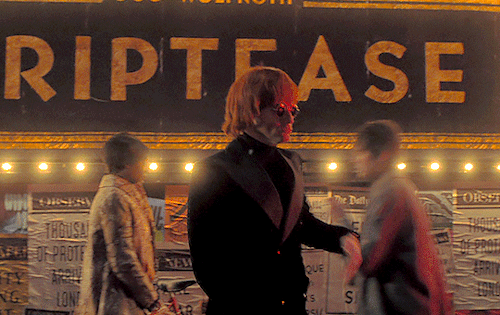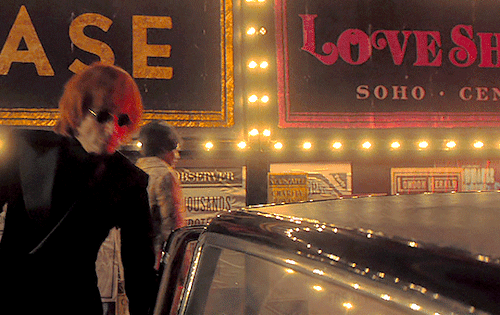antikate:xofemeraldstars:Character Study Collection — Crowley 307/∞Mise en scene is a fancy term for
antikate:xofemeraldstars:Character Study Collection — Crowley 307/∞Mise en scene is a fancy term for everything that you see in a film frame: the lighting, the props, the backgrounds, the actors, the costumes, hair and makeup, SFX - everything within the frame. All these things can help create or reinforce narrative meaning (obviously).Anyway I love this sequence because of the mise en scene: it establishes the era and place so beautifully and economically with just a few posters and lights.But beyond mimetic setting: I was thinking about the significance of the striptease and the love shop. And about why this scene takes place in the 1960s. Why not the 50s (repressed, buttoned up, obsessed with proprietary) or the 80s (selfish, vulgar, money and status obsessed)? The late 60s is the era of hippies and free love and social changes big and small, and represents a historical turning point toward a more individualistic, atomistic society, for good or ill. It’s the peak of a certain optimistic modernity that contrasts with the realities of the Cold War and the Vietnam War. You’ve also got to remember WWII ended only 20 years before this scene, which might seem like a long time but really isn’t. Especially when you’re immortal.And then the words: A striptease is the act of revelation, an undressing drawn out to suspend tension. I think the stripping here is important in that this scene reveals so much about Aziraphale’s love for Crowley (and his worry about Crowley’s destruction). The tease is that they still can’t be together, and even as Aziraphale flashes hints of understanding and a promise of the future. The Loveshop is not just as a nod towards the adult shop beside the bookshop in book canon but also because these two idiots are in love, yeah we know. But also it again represents change and a shift from repression to openness, from sex being a closed door experience to something you could buy and sell openly. Western society became much more permissive about sex/morality in this era. (Not completely of course, but more so than in the past.) (I am of course generalizing wildly and the summer of love in 69 wasn’t nearly as freeing as it seemed etc etc.)Other things of note about the holy water scene is that it is the last time Aziraphale’s clothes change except for when he’s play acting the gardener or the magician. Before the modern era Aziraphale seems quite good at keeping up with human fashion and idiom: it’s only in the 20th century that he seems out of place. Add in the “you go too fast for me Crowley” and you’ve got an Angel confronted by the increasingly rapid clicking of the clock towards Armageddon. He is confronted by change, and all the freedom and terror that comes with massive upheavals.Also the aesthetics of 1967 are cool.(first wombat in space remains inexplicable) -- source link
#good omens#meta analysis#antikate#not vc#aziraphale


